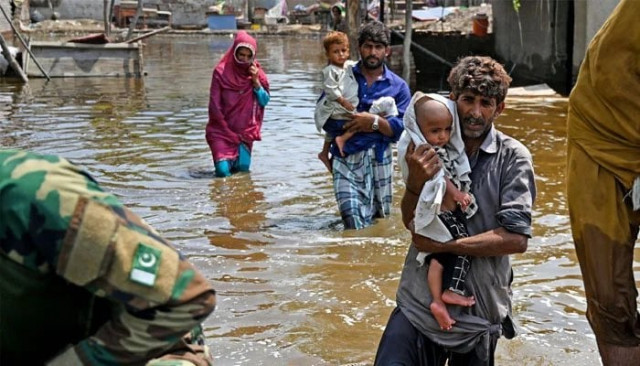Water-borne diseases could ‘get out of control’
At least 9 die in Sindh; UNICEF describes situation ‘beyond bleak’

At least nine more people died from water-borne diseases in flood-hit areas of Sindh – the worst affected province – raising the provincial death toll from gastroenteritis, diarrhoea and malaria and other diseases, to 318 since July 1, officials said on Tuesday.
Stagnant floodwaters spread over hundreds of kilometres have led to the outbreak of diseases, as hundreds of thousands of people displaced by the catastrophic floods were living in the open on roadsides. Some were still marooned on the rooftops of their flooded homes.
Over 2.7 million people have been treated for water-borne diseases at makeshift or mobile hospitals set up in flood-hit regions since July 1, the officials said, with 72,000 people treated at these facilities on Monday alone.
The Sindh government has said that over 1,200 medical facilities were still marooned in flood water. Malaria and diarrhoea were spreading fast, said Moinuddin Siddique, director at the Abdullah Shah Institute of Health Sciences in Sehwan. “We’re overwhelmed,” he told Reuters.
The World Health Organization (WHO) has said last week the surge in diseases had the potential for a “second disaster”. UNICEF has termed the situation “beyond bleak”, saying that at least 3.4 million girls and boys remain in need of immediate, lifesaving support.
Gerida Birukila, the UNICEF Pakistan Chief field Officer in Balochistan, described the situation “utterly heartbreaking”. She said that many families had no alternative but to drink the disease-ridden water. “Everywhere we go, we see desperation and despair growing.”
The children were surrounded by pools of stagnant water poisoned with fertilisers and faeces and swarming with diseases and viruses, sometimes meters away from where they sleep, she told a news briefing in Geneva on Tuesday, according to a statement.
Planning Minister Ahsan Iqbal, who also oversees the national flood response centre, told a press conference in Islamabad that “disease outbreak” was already there in the flooded areas and “we fear it may get out of control”.
Iqbal asked the medical volunteers to join hands with the government. He appealed for 2 million nutrition packs for mothers and newborn babies, saying the government was setting up more mobile hospitals in the affected areas.
An intense and long monsoon dumped around three times as much rain in the country than on average, in recent weeks, causing major flooding which killed 1,559 people, including 551 children and 318 women, according to the National Disaster Management Authority (NDMA).
This figure does not include those killed by disease in the aftermath. Scientists say the disaster was exacerbated by climate change that impacted nearly 33 million people, sweeping away homes, crops, bridges, roads and livestock in damages estimated at $30 billion.
The climate change issue, along with global conflicts, also figured prominently at the United Nations, when Secretary-General Antonio Guterres opened the annual General Assembly session. “A winter of global discontent is on the horizon,” he said.
“Inequalities are exploding, our planet is burning. People are hurting—with the most vulnerable suffering the most,” Guterres said, lashing out a “suicidal war against nature”. He said: “It’s time for an intervention … Polluters must pay,” Guterres said.
The announcement came as Prime Minister Shehbaz Sharif arrived in New York to participate in the United Nations General Assembly where he is expected to highlight Pakistan’s climate catastrophe.
AGENCIES



















COMMENTS
Comments are moderated and generally will be posted if they are on-topic and not abusive.
For more information, please see our Comments FAQ